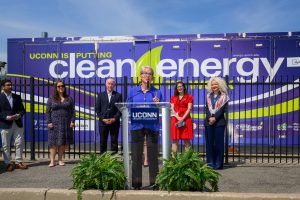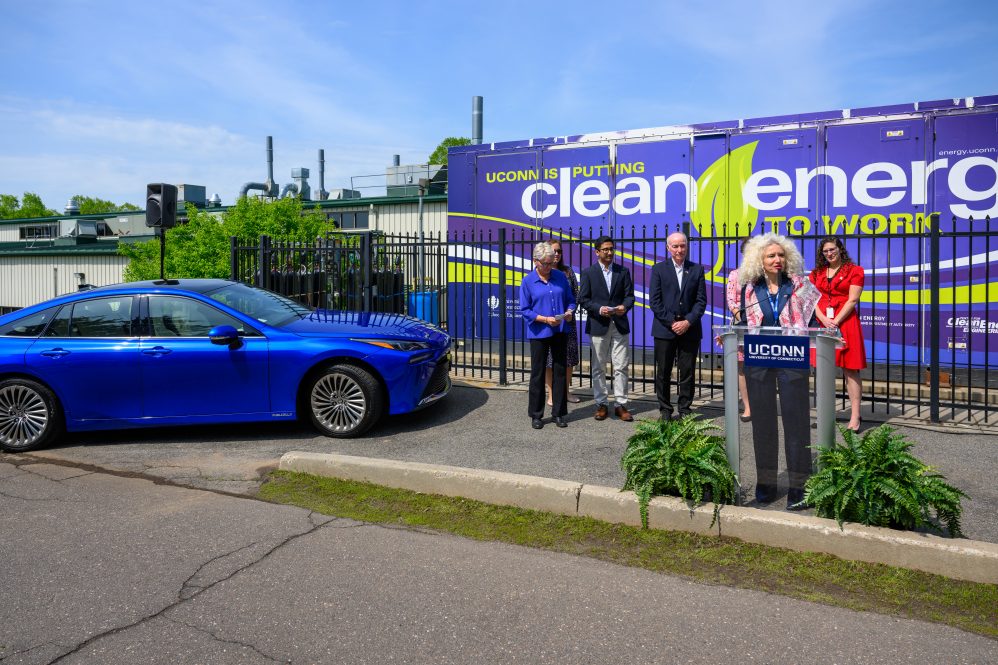UConn is putting its expertise in clean and renewable energy into practice as a member of a six-state, multiagency and university consortium seeking to establish a Northeastern hydrogen hub.
The consortium is laying the groundwork for a U.S. Department of Energy proposal funding opportunity anticipated to be announced this Fall. The federal government is expected to allot $8 billion as part of the Bipartisan Infrastructure Investment and Jobs Act.
The state of Connecticut joined the consortium in March, along with other state partners New York, New Jersey, Massachusetts, with Maine and Rhode Island joining recently. The New York State Energy Research & Development Authority (NYSERDA) is leading the effort, and Connecticut represents the gateway to New England as well as a key part of the I-95 corridor.
“Connecticut has long been a leader in addressing the climate crisis and in researching and developing innovative technologies, and this exciting partnership unites both of those key leadership areas,” Governor Ned Lamont said in a statement. “We’re proud to share a commitment to climate leadership, fuel cell innovation, and clean energy jobs with our neighboring states, which will position us competitively to bring federal investment in clean hydrogen to our region.”

UConn was announced as a strategic partner in the proposal in late August. The hydrogen hub – one of at least four proposed nationally – is designed to advance leadership in clean hydrogen infrastructure deployment, research, and development.
“The U.S. Department of Energy (DOE) released a notice of intent to fund the Bipartisan Infrastructure Law’s $8 billion program to develop regional clean hydrogen hubs (H2Hubs) across America,” says UConn Interim President Radenka Maric, herself a renowned expert on clean energy research and innovation. “UConn, a university with leading global experts in hydrogen production, storage and infrastructure, is proud to be part of this collaboration for the northeast region, leading the way in addressing climate change and delivering opportunities for greater health, resilience, and economic development.”
“H2Hubs will create networks of hydrogen producers, consumers, universities, and local connective infrastructure to accelerate the use of hydrogen as a clean energy carrier,” Maric continued. “The production, processing, delivery, storage, and end-use of clean hydrogen, including innovative uses in the industrial sector, is crucial for achieving President Biden’s goal of a 100% clean electrical grid by 2035 and net-zero carbon emissions by 2050.”
UConn brings the resources and acumen of the Center for Clean Energy Engineering (C2E2), a multidisciplinary research center focused on education and innovation of clean energy systems. C2E2 Director Ugur Pasaogullari says the consortium presents an opportunity for the center to apply its research on a large scale and collaborate with partners throughout the northeast, with far-reaching benefits for all involved.
“Hydrogen is already playing a very critical role in transitioning away from fossil fuels, not only in electricity or in surface transportation, but also in other sectors such as aviation and manufacturing,“ says Pasaogullari. “Our faculty and students have been developing hydrogen solutions for over two decades and we are excited to play a central role in implementing these solutions and experience their impact on society. We are looking forward to working with our regional partners in both deploying technology solutions and in developing programs to train the workforce needed to achieve this transition.”
UConn is the first public R1 research university, defined as a doctorate-granting institution with a very high level of research activity, in New England to sign the memorandum of understanding for the hydrogen hub. The agreement includes high-profile companies such as Pratt & Whitney and Eversource Energy, both of which have research centers within the Innovation Partnership Building at UConn Tech Park.
“The need for clean and renewable energy is only going to grow and UConn takes pride in its extensive research activities and educational pursuits into clean hydrogen and fuel cells,” says Pamir Alpay, UConn’s interim vice president for research, innovation, and entrepreneurship. “From the top of our leadership, UConn has made clean, renewable energy a primary research priority, as evident by our award-winning faculty, regional and global industrial partnerships, and state-of-the-art facilities on our campuses. Our University is committed to answering the challenges that clean hydrogen technology presents and preparing new generations of Connecticut students for careers in the field.”
Consortium partners will work together on initiatives designed to advance safe clean hydrogen energy innovation, address climate change, improve public health, and invest in the economic development of the states involved. In addition, the members will continue to integrate other forms of renewable energy, such as wind and solar, to reduce dependence on carbon-based sources.



